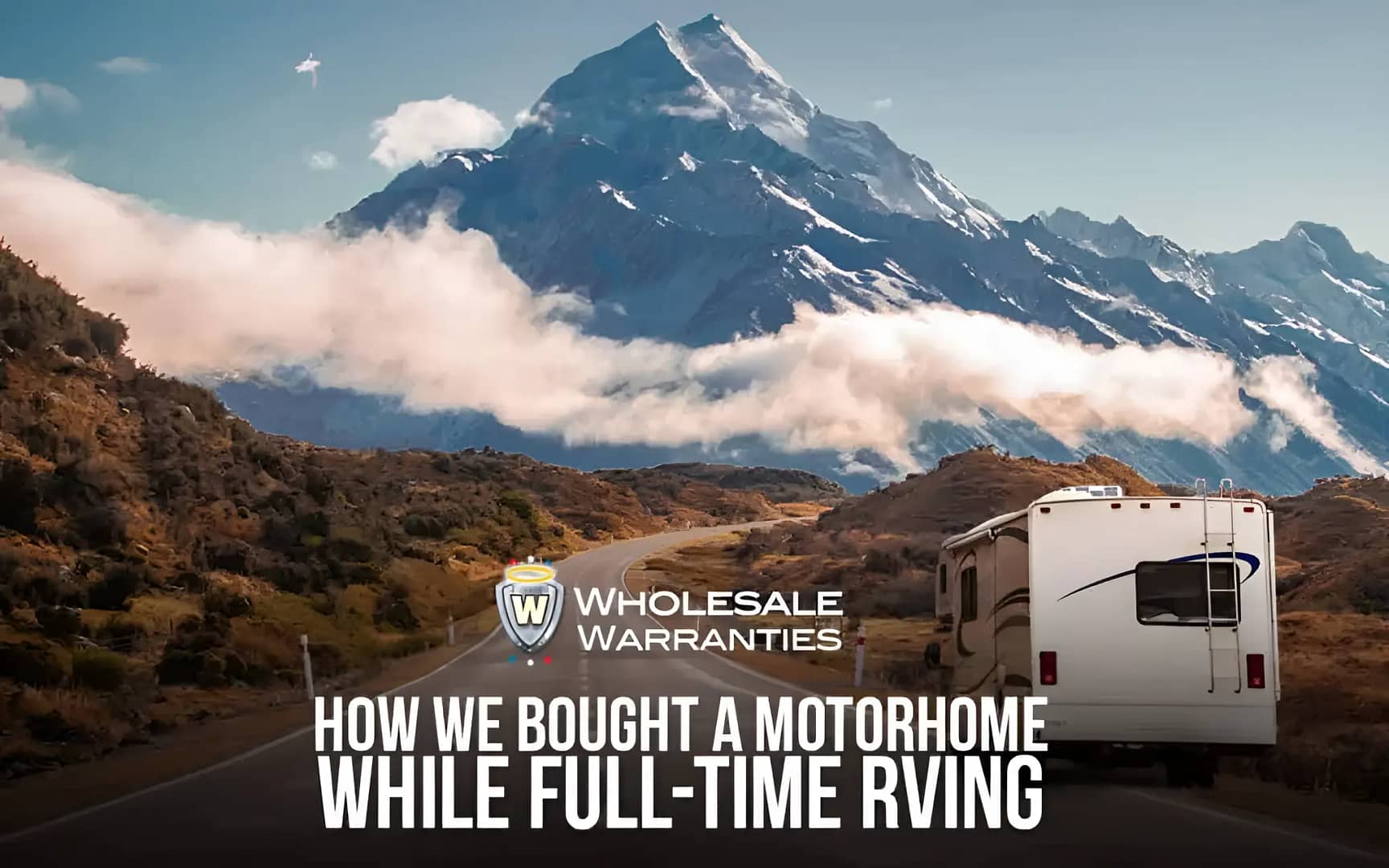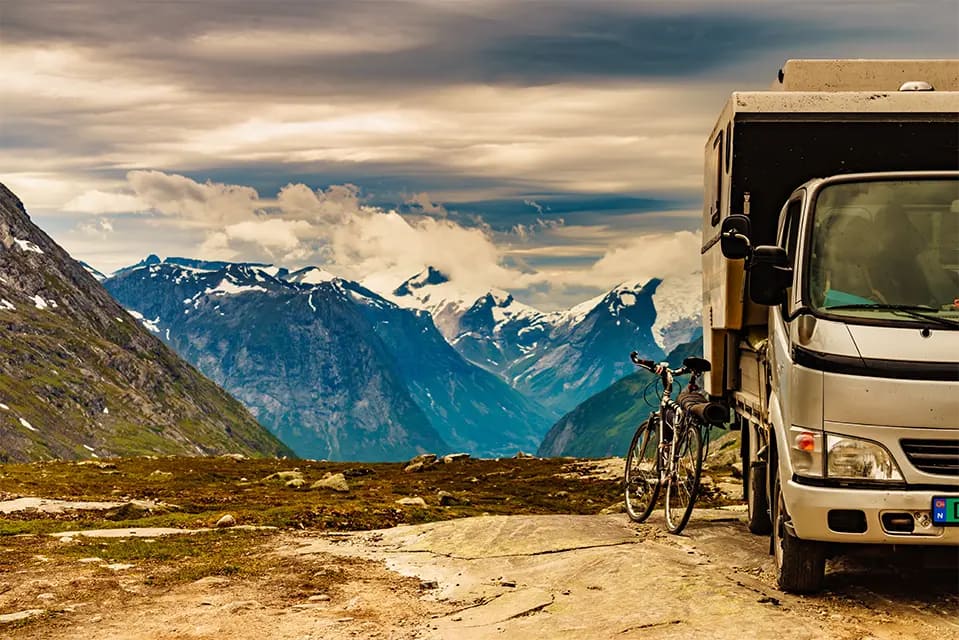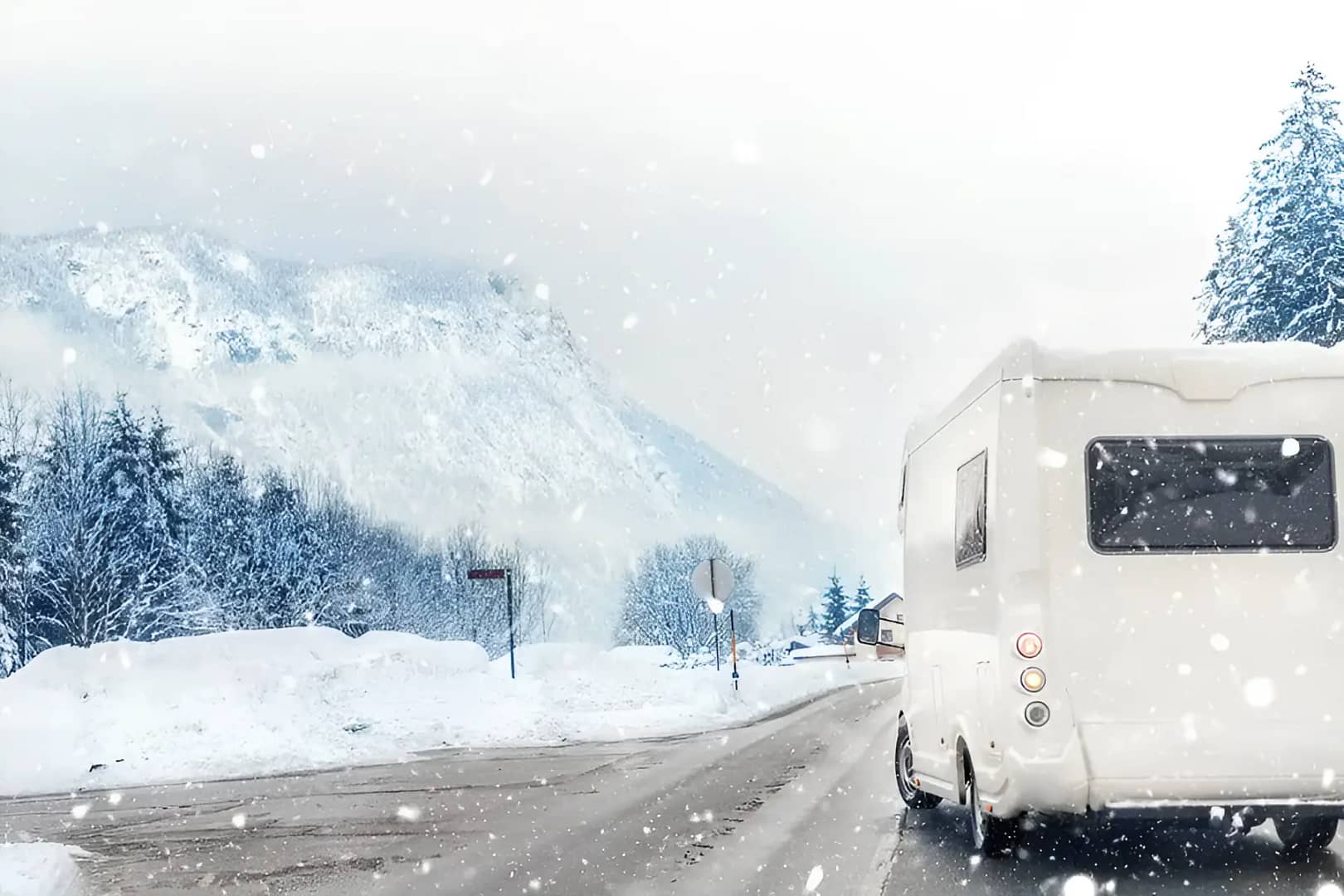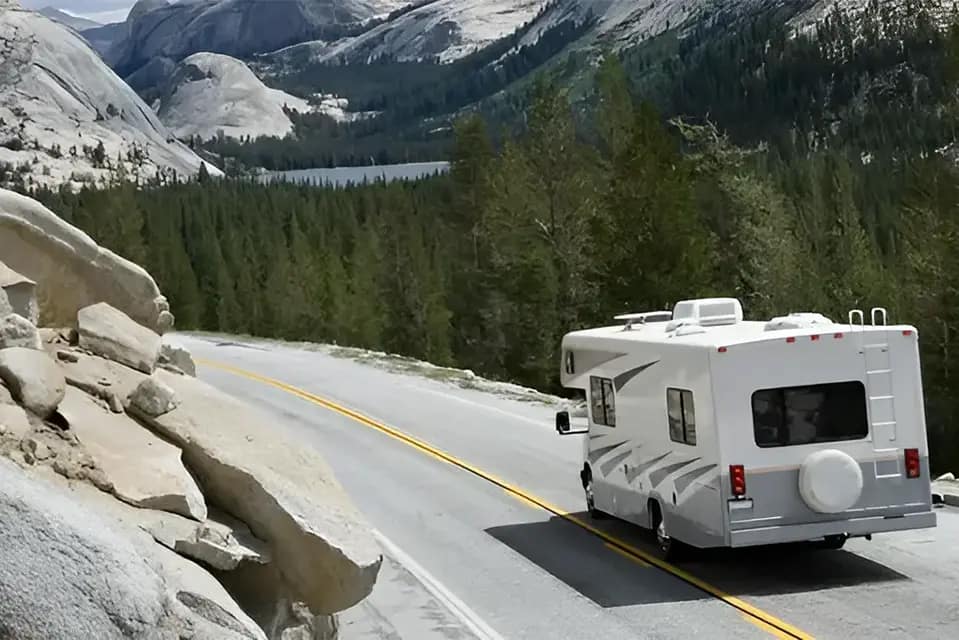Purchasing an RV takes a lot of patience and research. For Bryan and Luann of Where the Streets Wander, things were even more challenging. They set out to purchase a new motorhome while living full-time in their Class A.
The couple visited many shows and researched pricing to ultimately find their dream home-on-wheels. In this interview, Bryan and Luann answer some questions detailing the fun, and sometimes frustrating, aspects that go along with the RV purchase process.
Favor watching videos to reading? Catch a replay at the end of this post.

Staci (Wholesale Warranties): Tell us about Where the Streets Wander.
Bryan + Luann (Where the Streets Wander): Sure. Where the Streets Wander is our blog, which we started as full-time RVers.
Originally, when we made the decision to go full-time, there wasn’t a lot of information out there on how to design the RV life you want to live.
We started this blog to encourage and inspire other RVers to break free of the 9-5 before retirement while they’re still able to enjoy the full scope of the lifestyle.
S: How long have you been on the road?
B/L: Three years full-time.
S: What was the first RV that you owned?
B/L: Our first rig was a Class A Forest River Georgetown which we bought used in 2014. We really didn’t look at fifth wheels because we knew we wanted a motorhome when we started the process.
We weren’t full-time when we bought our first unit, and we were using it more on weekends. It became our vacation home, and we tried to find every opportunity to use it.
S: What type of research do you conduct when searching for a new rig?
B/L: We go to a lot of RV shows. When you walk in and out of a lot of RVs you get a feel for how well they’re constructed.
The biggest factor in our purchase is finding a good company to back the motorhome. The service the company provides is a big part of our decision.
Once we found a good manufacturer with quality service, it narrowed the playing field. After we had that, all we had to do was pick a model and floor plan.
S: So what feature is most important to you in a floorplan?
L: A washer and dryer. I wouldn’t have full-timed without one, that was how strongly I felt about it!
B: The model we chose also has four slides on it, which really helps with making it feel like you have more room on the inside. That’s helpful.
S: You both work from the road. Do you have an office set-up in your RV?
B/L: In the RV that we had right before we bought this one, we outfitted a desk area.
In this one, we decided that one of us is going to sit at the dinette while the other sits in the captain’s chair. We also have a pop-up table. In fact, that’s Bryan’s space. We just make it work.
S: RV life is all about adapting to what’s available.
S: Was your recent purchase new? And did you purchase through a private party or a dealership?
B/L: It was a dealership, brand new!
S: When you went to pick up the rig, did you have an inspection or walk-through on the unit?
B/L: We didn’t have an inspection because it was a new unit, but we did a walk-through where they explained everything.
S: You’ve had a few RVs now, do you have any tips when negotiating a price?
B/L: When we bought this rig it was discounted quite a bit. We also went in knowing we wanted some additions, like solar on the roof. Since we knew we wanted add-ons, the dealership threw in labor for free. We negotiated that part of the purchase.
Buyers should know a fair price before starting the process. Complete due diligence and look around comparing dealer to dealer, even if it’s a dealer not in your area, to find out what the units are selling for. The NADA guide is also a helpful tool.
We did our research and knew our price was good, but to get an edge we negotiated little extras to make it a great deal for us. That’s the number one tip I have for buyers. Try to get the dealer to include the things you want to add, if not completely for free, at least discounted for extra value.
S: So how are you liking the new rig?
B/L: We love it. The hardest thing, and I had no idea it was going to be this way, was moving from one RV into another.
It turned out to be more difficult than we thought. The dealer pulled up the old rig right next to the new one and we just went down the stairs, and up the stairs, and down the stairs transferring our belongings, but it took forever.
We were exhausted by the end, which we did not expect. We really underestimated that.
S: Were both rigs the same size? Did you have to get rid of anything to transition?
B/L: The sizes are about the same, the new motorhome is just a little bit shorter to make camping at some grounds easier. We knew the size difference before the purchase, so we had already downsized. We generally were just exchanging spaces, so that made it easier.
The guy who helped us move said that people would do the same thing and leave boxes of stuff that they’d have to get rid of because they couldn’t make it fit. I can’t imagine that!
S: You purchased an extended warranty from us. How was the process of working with our warranty specialists and purchasing that protection?
L: I started the process because our second rig, the one we traded to move into this one, started to have problems. A thousand dollars here, a thousand dollars there, in a matter of months we realized it was having a massive impact on our savings and income.
When we had decided on our rig, I talked to Farrah, a warranty specialist, and we started the process together. She was amazing.
I discussed our options with Bryan, because the warranty cost is an investment, but so is your RV. He wasn’t convinced, so we took a look more closely.
I called Farrah again to go over Bryan’s questions and put her on speaker. She was so patient and worked through every step with us. That was a big thing for us too. We didn’t want to feel scammed.
When you go to buy an RV you are sitting at the end of the transaction while the dealer pitches you an extended warranty. You have no idea what that warranty really does, it just sounds like a good idea. You can roll everything into your financing, but if you think about it, you have to go back to a certain repair facility. That was just insane for us.
When you’re full-time, you could be in Washington State and have to get something fixed, but if you bought the unit in Florida, you wouldn’t be able to get the service done. So that whole cross-coverage was a huge deal to us. As I said, we didn’t want to feel scammed on it and end up with a policy that covers everything, except the thing that broke.
We really put Farrah through the wringer with those questions about what you cover and what don’t you cover. I really like that about Wholesale Warranties. You lay it out there, this is the stuff we don’t cover. Black and white. Period. Anything else, we do.
It was an eye-opening experience. She was really helpful in answering all of the questions, and I think for us – we look back at how much money we put into our other RV for repairs, and this is a no-brainer.
S: It adds up really quick.
S: We see the claims come through every day on the customers that we cover, and it’s pretty crazy. Repairs continue to become more expensive.
S: I’m glad that you got that educational experience. We want people to understand what is and is not covered. I think the reason that most people hate warranties is because of things like phone warranties. The reason your phone breaks is never the reason that you’re allowed to get a replacement through a warranty.
B/L: Exactly. Most of the time, people don’t understand what they’re getting. Even while we were sitting at the dealership and signing the paperwork, the guy tried to sell us a warranty.
I told them we were purchasing with Wholesale Warranties. He started to ask what you would cover and what cost, and once I told him, he acknowledged a good deal and I said thanks, but no thanks to his program.
S: We love to hear that, that’s the experience we’re here to offer.
B/L: It took him back a bit.
S: Have you guys had to use the warranty yet?
B/L: Not yet. We’re still in our first year with this rig, so it’s under the manufacturer’s warranty. However, anytime an RV moves, even if they’re brand new, there’s stuff that goes wrong. So we actually have taken our RV back to the manufacturer, who had great service.
Anything that wasn’t done right when it rolled off the lot, they took care of. We feel like we’ve hedged our bets so to speak. We’ve got a great manufacturer and beyond that, we’ve covered it with your warranty. We feel really good about the whole thing.
S: Yeah, that’s a good one-two punch.
S: So you did run into some shakeout issues right off the lot?
B/L: Oh yeah. We have a fireplace and it wouldn’t even light! So the expectation of new versus used, you can talk about all day long, but failures still happen on brand new rigs.
When you buy an RV new, it’s never been used and manufacturers don’t have technicians open every drawer to make sure they’re sliding correctly. It’s little things. These being hand-made, things are going to need adjusting.
S: Part of our process here when we bring on new employees is to watch a video of how an RV is built, and it is pretty crazy to see all of the stuff that goes into it. Most units are really just hand made. So you’ve got to expect some of the shakeout issues.
B/L: They’re a rolling earthquake right?
S: Exactly.
S: What’s the top piece of advice you’d give to someone who is looking to buy a new RV?
B/L: I’d say, research a good manufacturer. From there you can pick what model suits you best. If you have someone really good backing it, that’s the most important thing. That and the dealer you purchase from, especially if you’re going to use that dealer for your service.
You should understand the service process and how they’re going to take care of you if you’re purchasing from a local dealer. Check reviews on Google and elsewhere and see what people are saying about them.
S: That research is really important. I find that the RV community is very vocal about their experience. Whether it’s with warranties, manufacturers, or campgrounds, the information is out there if you look for it.
S: Getting back to your general RV life, what is your favorite thing about full-time living?
L: That it takes thirty minutes to clean the whole RV!
B: For me, it’s that wherever we travel we’ve got our home. Our own bed and things like that are a nice feeling. To set up somewhere, have a great time, and then have the ability to come back home.
S: Do you have a top travel destination?
B/L: So far, although you can’t take the RV to Mackinac Island, the upper peninsula and northern Michigan exceeded our expectations.
You hear about Florida a lot, and Southern California deserts in the winter, but there are some really beautiful places up north too.
It was very surprising. We were so in love with Michigan, but we kept looking at each other reminding one another that it snows. A lot.
S: There you go, the benefit of RVing. It can be your home for a little while but not when it’s snowing.
B/L: Right. We like Florida too, but getting away from Florida in the summers is key.
S: It gets a little crowded.
S: How can readers follow your full-time journey?
B/L: At streetswander.com and we also have designed a travel planner just for RVers, you can find that at RVtravelplanner.com!
S: Bryan and Luann, thank you so much for joining us today, this has been amazing.
B/L: Thanks for having us!
RV Extended Warranties
Get a free quote for an RV Extended Warranty today.




